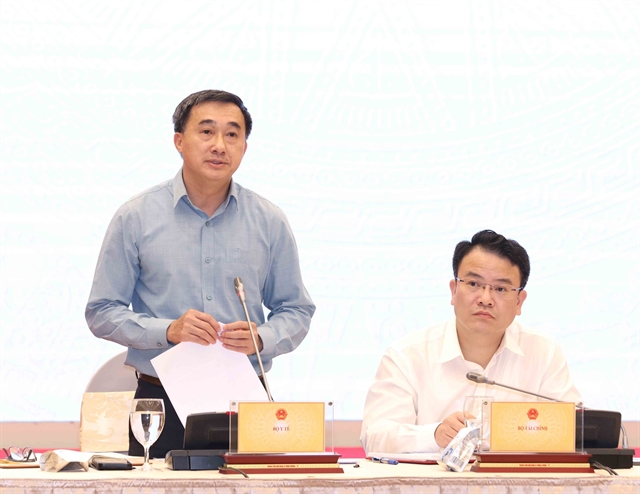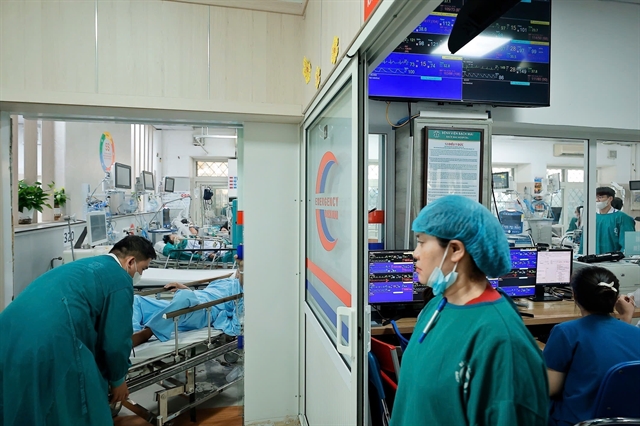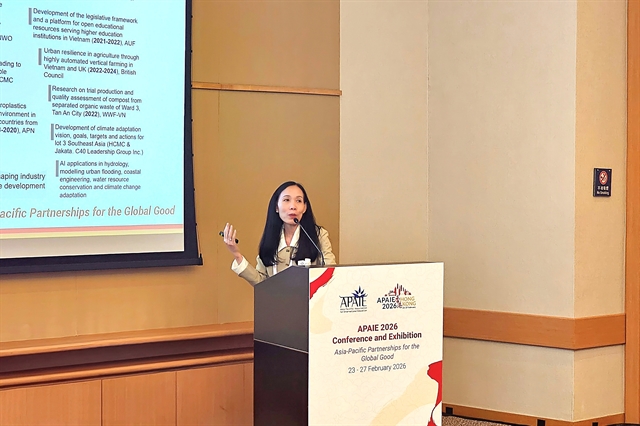 Politics & Law
Politics & Law


|
| Deputy Minister of Health Trần Văn Thuấn spoke at the regular Government press conference on May 6. — VNA/VNS Photo |
HÀ NỘI — Deputy Minister of Health Trần Văn Thuấn said Party General Secretary Tô Lâm’s directive to move towards free hospital care for all citizens is a major and profoundly humane policy that clearly reflects the superiority of the Vietnamese system in caring for the health of the people.
“The General Secretary’s directive on progressing towards free hospital care for all is not only a long-term strategic orientation and a goal that the health sector is determined to achieve; it is also a policy that touches the hearts of millions and reflects the people’s aspirations,” said Deputy Minister Thuấn during the regular Government press conference on Tuesday, in response to media question on the issue.
According to Thuấn, implementing this policy will bring numerous benefits: increasing access to healthcare services, promoting early detection, diagnosis, and treatment of diseases, improving treatment effectiveness, optimising the use of financial resources for healthcare, and reducing the financial burden on citizens.
It will also help people escape poverty, improve the quality of human resources, and boost labour productivity, which would eventually contribute to GDP growth and reduce the risk of economic stagnation. Additionally, the policy will promote social equity, as prioritising free hospital care for ethnic minorities and people in remote areas will enhance healthcare access for vulnerable groups and reduce the wealth gap.
From 2026 to 2030, the health sector aims for 90 per cent of the population to have full access to disease prevention services, health promotion, age-appropriate vaccination, primary healthcare, reproductive and maternal-child health services, mental health care, school health, risk screening, annual health check-ups, chronic disease management, and general and family medicine—starting from the grassroots level.
The sector also targets annual health check-ups for all citizens on an annual basis, and each citizen will be issued with electronic health records for lifetime health management, and can live in a green, clean environment with food safety and proper nutrition. Elderly people, people with disabilities, and other vulnerable groups will also receive social care and attention.
The health sector estimates that with a population of 100 million and an average cost of VNĐ250,000 (about $9.6) per check-up, the total annual cost for routine health check-ups for everyone would be approximately VNĐ25 trillion (nearly $963 million).

|
| The emergency ward at Bạch Mai Hospital, Hà Nội. — VNA/VNS Photo |
He affirmed that financial resources for public healthcare will be secured. The state budget will increase support for health insurance purchases, aiming for 100 per cent population coverage. The scope of health insurance benefits will be expanded, gradually including coverage for preventative services, screening, early diagnosis, and early treatment. The goal is to reduce the proportion of out-of-pocket expenses in total healthcare spending to below 20 per cent, and the co-payment rate for insured treatment to under 10 per cent (currently, out-of-pocket spending accounts for 40–45 per cent).
Looking ahead to 2045, the healthcare system is expected to fully and promptly meet the requirements of health protection, care, and promotion. It will aim to reduce the financial burden on the public and implement the policy that citizens will not have to pay additional costs when accessing services covered by health insurance. This will help position Việt Nam among the world’s leading countries in terms of social welfare in healthcare.
Regarding ongoing efforts, Deputy Minister Thuấn said the Ministry of Health is drafting a resolution to submit to the Government and the Politburo. This resolution will propose breakthroughs in healthcare to meet development demands in the new era, including policies for developing the health system and moving towards free hospital care for all.
The Ministry is also expediting the drafting of a Government Decree detailing and guiding the implementation of the Law on Health Insurance, expected to take effect on July 1, 2025. The Decree will define groups eligible for state support in paying health insurance premiums and detail the scope of benefits for health insurance participants.
In parallel, the Ministry is working on circulars specifying the list, rates, levels, and conditions for the reimbursement of medical techniques, medicines, and equipment covered by health insurance. These will include provisions to increase reimbursement rates for certain medicines and medical devices towards full subsidies for specific groups.
As for the roadmap, from 2026 to 2030, the Ministry will propose pilot policies, such as expanding the basic healthcare service package to 20–30 per cent of the base salary (up from the current 15 per cent), periodic check-ups, early diagnosis and screening for certain diseases in at-risk groups (by age, occupation, etc.), and increasing health insurance coverage rates to 100 per cent for those currently receiving 95 per cent, with a gradual increase for those at 80 per cent.
Additionally, the Ministry will explore expanding reimbursement rates for medical services, medicines, and devices for groups such as the poor, near-poor, and lower-middle-income populations, as well as for certain illnesses. It will also design sub-funds within the health insurance fund—including a fund for medical treatment, a contingency fund, and a support fund for critical illnesses. Health insurance will be integrated with the national target programme on health and population development for 2026–2035 to enhance efficiency and prevent waste. Measures will be put in place to strictly monitor and prevent abuse of free healthcare services, which could lead to resource waste and overload at medical facilities.
Between 2030 and 2035, the Ministry plans to comprehensively revise the Law on Health Insurance and complete policies and regulations to ensure sustainable, stable, and long-term free public healthcare.
“The two directions put forward by the General Secretary – annual check-ups for all citizens and free hospital care for the entire population – are not only healthcare objectives, but also powerful reminders that policies must be rooted in people, serve the people, and contribute to a sustainable, developed Việt Nam. These goals are not out of reach if we have strong political will, broad social consensus, and a clear, methodical implementation roadmap,” Deputy Minister Thuấn added. — VNS




